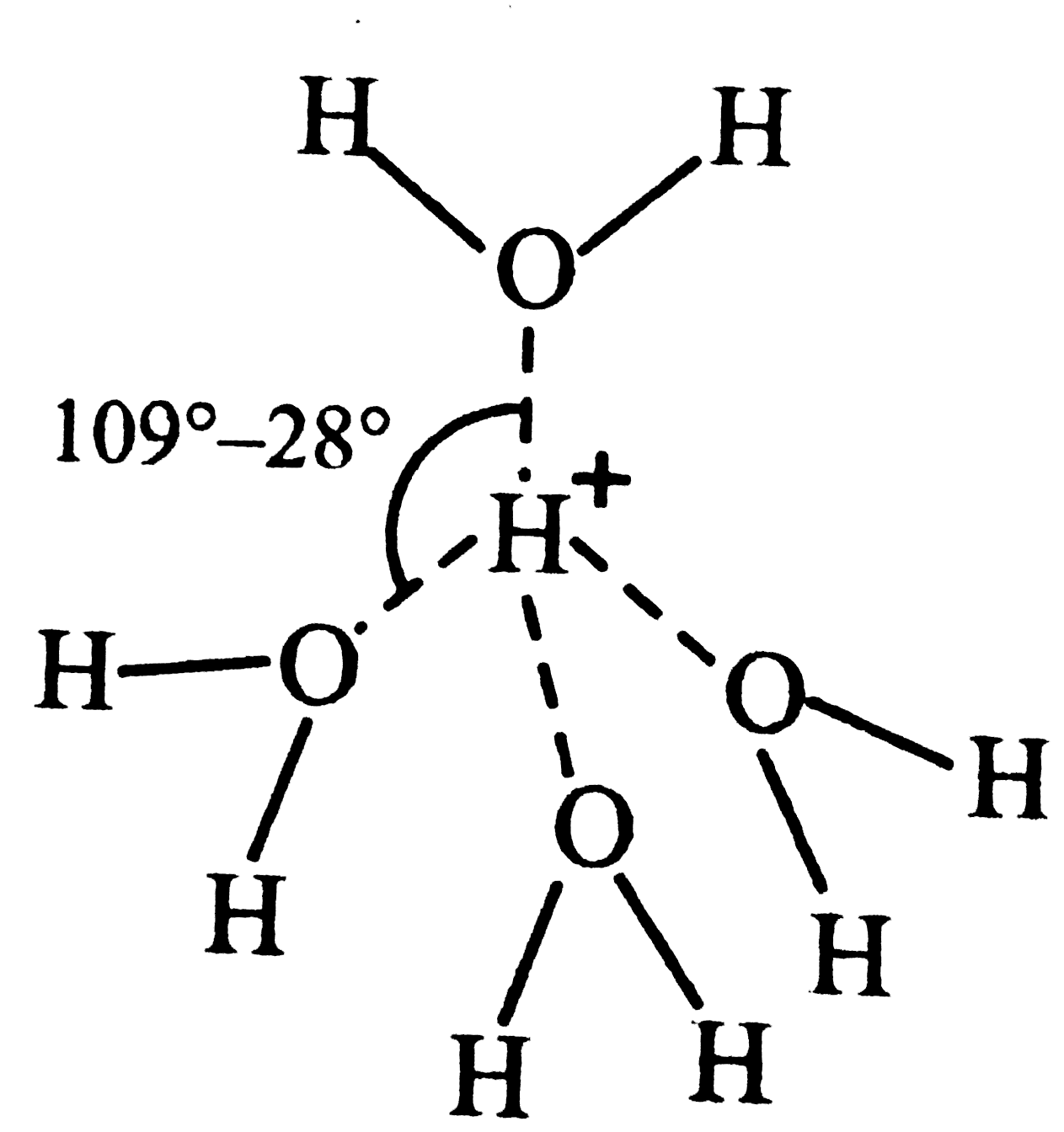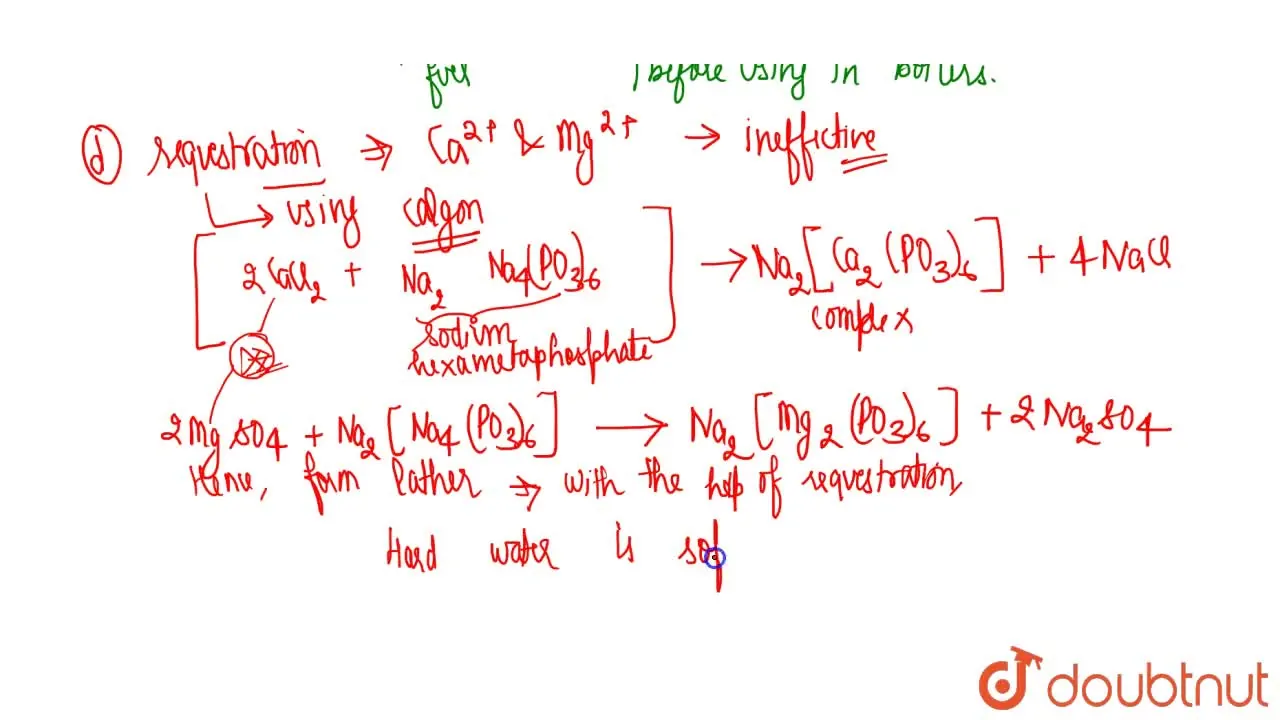a. What does [H9O4]⊕ stand for ? Draw its structures.
b. Can sodium bicarbonate make water hard?
c. Hard water is softened before using in boilers. Why?
d. What is sequestration? How is hard water made soft by sequestration?
(a) H9O+4 stands for hydrated proton . In [H9O4]+, H+ is tetrahedrally surrounded by four water molecules as shown.
(b) NaHCO3 cannot make water hard because soaps themselves are sodium salts of fatty acids which are soluble in water.
(c) Hard water on boiling gives precipitates of MgCO3,CaCO3andCaSO4 which form scales in boilers . The formation of these boiler scales causes rapid deterioration of the boiler due to over heating . Further , these boiler scales are non-conducting . Therefore, more fuel is consumed . Therefore, in order to avoid formation of these scales, hard water is softened before using in boilers.
(d) Sequestration means to render ineffective . The hardness of water is due to the presence of Ca2+ and Mg2+ ions. These ions are rendered ineffective by treating them with sodium hexametaphosphate , commercially called calgon. When calgo is added to hard water, the Ca2+andMg2+ ions present in it combine with sodium hexametaphosphate to form soluble complexes of calcium and magnesium salts . These complex calcium and magnesium ions do not form any precipitate with soap and hence readily produce lather with soap solution. In this way, hard water is softened by sequestration. 
Related Playlists
- BOOK - PRADEEPCHAPTER - HYDROGEN EXERCISE - NCERT Questions and Exercises with Answers (NCERT INTEXT SOLVED QUESTIONS)40videos
HYDROGEN
- BOOK - PRADEEPCHAPTER - HYDROGEN EXERCISE - NCERT Questions and Exercises with Answers (NCERT Exercises)1videos
HYDROGEN
- BOOK - PRADEEPCHAPTER - HYDROGEN EXERCISE - CONCEPTUAL QUESTIONS (Dihydrogen)7videos
HYDROGEN
- BOOK - PRADEEPCHAPTER - HYDROCARBONSEXERCISE - Competition Focus (JEE(main and advanced)/Medical Entrance) VIII. ASSERTION - REASON TYPE QUESTIONS31videos
HYDROCARBONS
- BOOK - PRADEEPCHAPTER - ORGANIC CHEMISTRY-SOME BASIC PRINCIPLES TECHNIQUESEXERCISE - Competition Focus (Jee (Main and Advanced)/Medical Entrance) VIII. Assertion-Reason Type Questions25videos
ORGANIC CHEMISTRY-SOME BASIC PRINCIPLES TECHNIQUES
Similar Questions
a. What does [H9O4]⊕ stand for ? Draw its structures.
b. Can sodium bicarbonate make water hard?
c. Hard water is softened before using in boilers. Why?
d. What is sequestration? How is hard water made soft by sequestration?View SolutionCan sodium bicarbonate make water hard ? Explain.
View Solution(i) Water cannot be used to extinguish petrol fires. Why?
(ii) Hard water is softened before using in boilers. Explain.View SolutionExplain why calcuim ion makes water hard, but sodium ion does not.
View SolutionWhat do you understand by Hard and Soft water? How is hardness of water removed by washing?
View Solution(a) Why do soaps not work in hard water ?
(b) What are the disadvantages of using hard water ?View SolutionHow are soaps different from detergents?
What makes water hard?View SolutionExplain the following:
(i) Temporary hard water becomes soft on boiling.
(ii) Water can extinguish most fires but not petrol fire.
(iii) Hard water is softened before being used in boilers.View SolutionCertain phosphates are helpful in making hard water soft.Which phosphates are used and how do they help in making water soft?
View SolutionCertain phosphates are helpful in making hard water soft.Which phosphates are used and how do they help in making water soft?
View Solution


